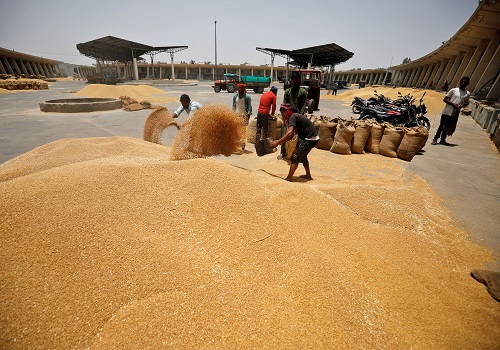Global Wheat Imports Decline Amid Higher Local Output, Economic Strains by Amit Gupta, Kedia Advisory

Global wheat imports are set to decline in 2025 as top buyers like China, Indonesia, and Egypt reduce purchases due to higher domestic output and economic challenges. The USDA projects a 37% drop in Chinese wheat imports, while Indonesia shifts to domestic rice flour. A stronger U.S. dollar is also making imports costlier for emerging markets. Despite tightening global stockpiles, lower demand is capping price gains. Additionally, China has delayed shipments of up to 600,000 tons, signaling a bearish trend. Meanwhile, Middle Eastern buyers like Iraq are also reducing imports. While concerns over Black Sea supply persist, the overall demand slowdown could keep wheat prices under pressure.
Key Highlights
* China’s wheat imports may fall 37% in 2025 amid rising local output.
* Indonesia shifts to rice flour, cutting wheat imports due to a stronger dollar.
* Egypt’s economic woes and state purchases are reducing import volumes.
* Global wheat stockpiles are projected to hit a nine-year low.
* Delayed Chinese shipments and weaker demand may pressure global wheat prices.
Global wheat prices have been under pressure as import demand from major buyers weakens. Despite concerns over lower output in key producing regions like the Black Sea, the United States, and India, slower purchases from China, Indonesia, and Egypt are capping price gains. The U.S. Department of Agriculture (USDA) forecasts Chinese wheat imports to decline by 37% in 2025, reaching just 8 million metric tons. Indonesia’s wheat demand is also weakening as local rice flour production rebounds, and a depreciating rupiah makes imports costlier.
Supporting this bearish trend, China has delayed shipments of up to 600,000 tons, reflecting ample domestic supply after a record 2024 harvest. Similarly, Egypt's wheat imports have slowed, with the country relying on previous state purchases. Egypt imported 14.7 million tons in 2024, but ongoing economic issues and currency depreciation have made additional purchases challenging. The Middle East’s other key buyer, Iraq, halted wheat imports for its subsidy program due to surplus production.
Adding to the headwinds, economic slowdowns in these key markets are reducing consumer demand. China's economic growth is projected to slow in 2025, while Egypt struggles with low GDP growth and financial constraints. Meanwhile, the global wheat supply remains tight, with USDA estimating stockpiles will drop to their lowest level in nine years. However, despite this tightening, sluggish import demand and currency fluctuations in emerging markets are preventing significant price surges.
Finally
With rising domestic production and economic concerns among major buyers, global wheat imports are set to decline in 2025. Despite tighter stockpiles, reduced demand may keep wheat prices under pressure.
Above views are of the author and not of the website kindly read disclaimer






















